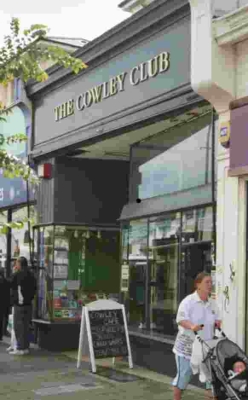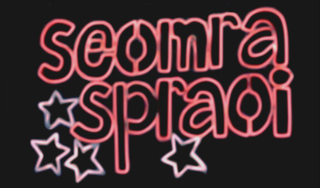
Squatting is the action of occupying an abandoned or unoccupied area of land or a building, usually residential, that the squatter does not own, rent or otherwise have lawful permission to use. The United Nations estimated in 2003 that there were one billion slum residents and squatters globally. Squatting occurs worldwide and tends to occur when people find empty buildings or land to occupy for housing. A variation is Street Squatting which is the action of occupying public areas without lawful permission, such as outdoor parks or streets. It has a long history, broken down by country below.
The London Action Resource Centre (LARC) is an anarchist infoshop and self-managed social centre situated in Whitechapel, in the East End of London. Previously a school and a synagogue, it was purchased in 1999. It hosts meetings and events from various groups and is part of the UK Social Centre Network.

Infoshops are places in which people can access anarchist or autonomist ideas. They are often stand-alone projects, or can form part of a larger radical bookshop, archive, self-managed social centre or community centre. Typically, infoshops offer flyers, posters, zines, pamphlets and books for sale or donation. Other items such as badges, locally produced artworks and T-shirts are also often available. Infoshops can also provide printing and copying facilities for people to produce their own literature or have a meeting space.

UFFA is an anarchist youth house in Trondheim, Norway. The self-managed social centre provides a location for concerts and self-organised activities such as an infoshop at the Ivar Matlaus Bokkafé, a hacklab and an anarchist newspaper. Squatted in 1981, it moved to its present location the following year. The centre was burnt down in 2010 and then rebuilt.

The Cowley Club is a libertarian self-managed social centre in Brighton, England. It opened in 2003, providing resources and meeting spaces for groups and individuals active in areas such as workplace and unemployed struggles, international solidarity, animal liberation, ecological defence, feminist and queer activism and opposing the arms trade. Its political identity is close to anarchism or libertarian socialism. It also houses a vegan community café, a bookshop, and free English lessons for migrants.

Blitz House is an anarchist, communist and socialist self-managed social centre in Oslo, Norway, founded in 1982. Having started as a squat, it is now legalized and based on Pilestredet. The centre hosts activities such as political meetings, a feminist radio station (radiOrakel), a vegan café and practice rooms for musicians.

Seomra Spraoi was a self-managed social centre in Dublin, Ireland which first opened in 2004 and closed in 2015. It was run on a not-for-profit basis by an anti-capitalist collective with anarchist principles.

Self-managed social centres in Italy exist in many cities. They are part of different left-wing political networks including anarchist, communist, socialist, and autonomist. The centres tend to be squatted and provide self-organised, self-financing spaces for alternative and noncommercial activities such as concerts, exhibitions, farmers' markets, infoshops, and migrant initiatives. Over time, some but not all projects have opted to legalize their status.

In England and Wales, squatting—taking possession of land or an empty house the squatter does not own—occurs for a variety of reasons which include needing a home, protest, poverty, and recreation. Many squats are residential; some are also opened as social centres. Land may be occupied by New Age travellers or treesitters.
The Autonomous Centre of Edinburgh, also known as ACE, is an infoshop and autonomous social centre in Edinburgh, Scotland. It was founded in 1997, although it follows on from previous groups.
Self-managed social centers, also known as autonomous social centers, are self-organized community centers in which anti-authoritarians put on voluntary activities. These autonomous spaces, often in multi-purpose venues affiliated with anarchism, can include bicycle workshops, infoshops, libraries, free schools, meeting spaces, free stores and concert venues. They often become political actors in their own right.

121 Centre was a squatted self-managed social centre on Railton Road in Brixton, south London from 1981 until 1999. As an anarchist social centre, the venue hosted a bookshop, cafe, infoshop, library, meeting space, office space, printing facility, and rehearsal space. Organisations using the space included Food Not Bombs, Anarchist Black Cross prisoner aid chapters, an anarcho-feminist magazine, a squatters aid organisation, and an anarchist queer group. Regular events at 121 Centre included punk concerts, a women's cafe night, and a monthly queer night. The centre kept a low profile and was one of the longest-lasting squats in London.

Squatting became a political phenomenon in the Czech Republic after the Velvet Revolution in 1989. Squats in Prague included Sochora, Stary Střešovice and Ladronka. Milada was occupied in 1998 and following its final eviction in 2009, there was a lull in squatting actions. In the 2010s a new social movement squatted houses to highlight the number of derelict properties in Prague and the social centre Klinika was founded in 2014.

Squatting in Spain refers to the occupation of unused or derelict buildings or land without the permission of the owner. In Francoist Spain migrant workers lived in slums on the periphery of cities. During the Spanish transition to democracy, residential squatting occurred in Spanish cities such as Barcelona, Bilbao, Madrid, Valencia and Zaragoza. From the 1980s onwards a new generation of squatters set up self-managed social centres which hosted events and campaigns. The 1995 Criminal Code among other things criminalised squatting, but failed to stop it. Social centres exist across the country and in Barcelona and Madrid in particular. In the Basque Country they are known as gaztetxes.
Base for Anarchy & Solidarity in Easton, commonly known as BASE, is an anarchist community co-operative and self-managed social centre in Easton, Bristol, England. Formerly known as Kebele, the building was squatted in 1995.
Okupa Che is an anarchist self-managed social centre in Mexico City, Mexico. An auditorium and associated rooms were squatted during the 1999–2000 UNAM strike on 4 September 2000 at the National Autonomous University of Mexico (UNAM).

56a Infoshop is a self-managed social centre, archive, and shop based in Elephant and Castle, Southwark, London. Its collection centres around left and far-left materials including information on anarchism, anti-gentrification, to squatting.
The modern political squatting movement began in Hamburg, Germany, when Neue Große Bergstraße 226 was occupied in 1970. Squatters wanted to provide housing for themselves amongst other demands such as preventing buildings from being demolished and finding space for cultural activities. The Hafenstraße buildings were first occupied in 1981 and were finally legalized after a long political struggle in 1995. The still extant Rote Flora self-managed social centre was occupied in 1989. Squatting actions continue into the present; more recent attempts are quickly evicted, although the Gängeviertel buildings were squatted and legalized in the 2010s.


















